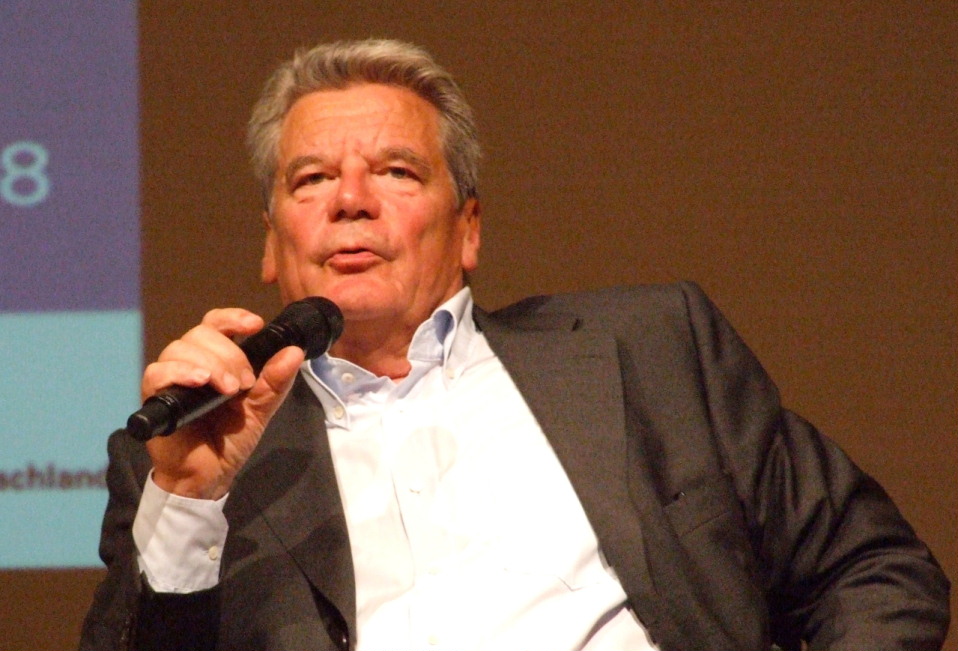Former President of Germany Joachim Gauck to visit VMU

The former President of the Federal Republic of Germany, Joachim Gauck, will be visiting Lithuania on 18-21 October. The guest will be awarded the regalia of Honorary Doctor at Vytautas Magnus University (VMU). He will also hold a discussion with students at the university on how the neo-Stalinist regime of Vladimir Putin became entrenched in Russia due to the absence of desovietisation.
Joachim Gauck’s discussion with students will take place on Wednesday, 19 October, at 2.15 p.m. in the VMU Leonidas Donskis Library (V. Putvinskio g. 23). The discussion will be moderated by Professor Robert van Voren, Director of the Andrei Sakharov Research Center for Democratic Development at VMU.
Joachim Gauck is granted the title of VMU Honorary Doctor for his achievements in the fields of international cooperation, peacekeeping and strengthening of democracy, and for his significant contribution to fostering the values of freedom, justice, and solidarity. The regalia of Honorary Doctor will be awarded to the guest at the solemn meeting of the VMU Senate on 19 October at 4 p.m. in the VMU Aula Magna (Gimnazijos g. 7).
In 1967, Gauck was ordained an Evangelical Lutheran priest. Because of this, and because of his undisguised anti-communist views, he was under constant surveillance by the East German secret police (Stasi). In 1989, Gauck took part in anti-communist protests in East Germany and founded the opposition movement New Forum, which contributed to the downfall of the Socialist Unity Party of Germany. From 1990, he served for a decade as Federal Commissioner for the Stasi Records Agency. This FRG institution helped uncover the crimes of the former communist East German secret police. In 2012, he won the presidential election of the Federal Republic of Germany.
“Joachim Gauck is a unique personality whose life has been dedicated to the fight against totalitarian communism and for freedom and democracy in general. He was widely praised for his enormous contribution to the exposure of crimes of the communist secret police. He is really one of the outstanding moral leaders of the communist and post-communist period”, says VMU Professor Robert van Voren.
In his activities, Joachim Gauck focuses on the crimes and political repression of communist regimes in East Germany. In 2008, he was one of the signatories of the Prague Declaration on European Conscience and Communism. This Declaration calls for the condemnation of communism, the exposure of the crimes of communists, and their punishment. The British newspaper The Independent has called Joachim Gauck “Germany’s answer to Nelson Mandela”, while The Wall Street Journal has described him as “the last of a breed: the leaders of protest movements behind the Iron Curtain who went on to lead their countries after 1989”, comparing him to Václav Havel and Lech Wałęsa.
Gauck’s political views were strongly influenced by his family’s experiences: in 1951, his father was exiled to Siberia for no reason. After four years of uncertainty, his father returned, but was significantly changed by the exile, both physically and psychologically. “The fate of our father was like an educational cudgel. It led to a sense of unconditional loyalty towards the family which excluded any sort of idea of fraternisation with the system,” the former German president writes in his memoirs.
In his academic work, Gauck has written extensively about Soviet-era concentration camps, communist crimes, and political repression in East Germany. Among his most important works is a book on the importance of defending freedom and human rights called Freedom: A Plea for the Defense of Freedom and Human Rights around the Globe (2012). Some of his awards include the Hannah Arendt Prize, the Imre Nagy Prize (Hungary), the Leo Baeck Medal, and the Order of Vytautas the Great with the Golden Chain.












